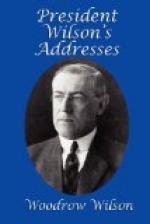[Delivered at a joint session of the two Houses of Congress, December 8, 1914.]
GENTLEMEN OF THE CONGRESS:
The session upon which you are now entering will be the closing session of the Sixty-third Congress, a Congress, I venture to say, which will long be remembered for the great body of thoughtful and constructive work which it has done, in loyal response to the thought and needs of the country. I should like in this address to review the notable record and try to make adequate assessment of it; but no doubt we stand too near the work that has been done and are ourselves too much part of it to play the part of historians toward it.
Our program of legislation with regard to the regulation of business is now virtually complete. It has been put forth, as we intended, as a whole, and leaves no conjecture as to what is to follow. The road at last lies clear and firm before business. It is a road which it can travel without fear or embarrassment. It is the road to ungrudged, unclouded success. In it every honest man, every man who believes that the public interest is part of his own interest, may walk with perfect confidence.
Moreover, our thoughts are now more of the future than of the past. While we have worked at our tasks of peace the circumstances of the whole age have been altered by war. What we have done for our own land and our own people we did with the best that was in us, whether of character or of intelligence, with sober enthusiasm and a confidence in the principles upon which we were acting which sustained us at every step of the difficult undertaking; but it is done. It has passed from our hands. It is now an established part of the legislation of the country. Its usefulness, its effects will disclose themselves in experience. What chiefly strikes us now, as we look about us during these closing days of a year which will be forever memorable in the history of the world, is that we face new tasks, have been facing them these six months, must face them in the months to come,—face them without partisan feeling, like men who have forgotten everything but a common duty and the fact that we are representatives of a great people whose thought is not of us but of what America owes to herself and to all mankind in such circumstances as these upon which we look amazed and anxious.
War has interrupted the means of trade not only but also the processes of production. In Europe it is destroying men and resources wholesale and upon a scale unprecedented and appalling. There is reason to fear that the time is near, if it be not already at hand, when several of the countries of Europe will find it difficult to do for their people what they have hitherto been always easily able to do,—many essential and fundamental things. At any rate, they will need our help and our manifold services as they have never needed them before; and we should be ready, more fit and ready than we have ever been.




